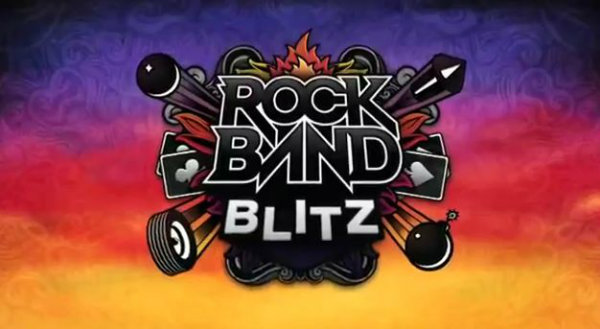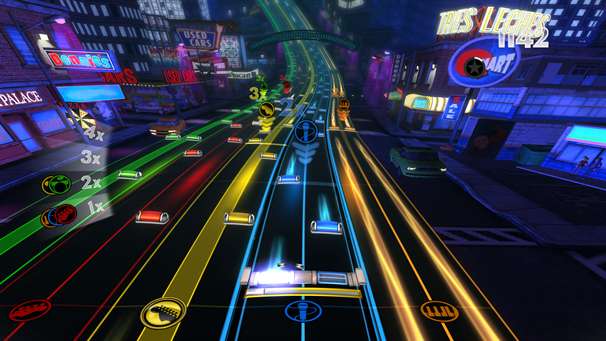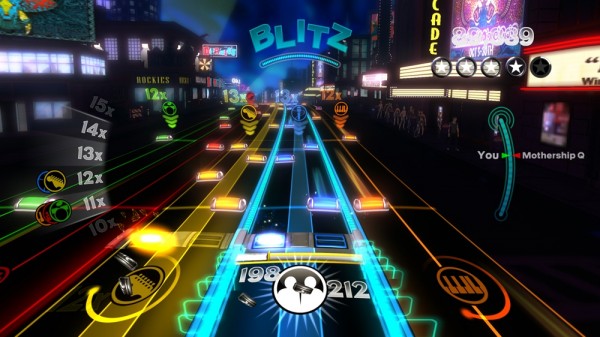Despite how you may feel about the ‘casual’ nature of the genre’s fans or the business strategies of its creators, there is no denying that rhythm games have history. From angry neighbors to drunkenly bullying friends into doing vocals to building furniture out of guitar controllers, rhythm games have put us — and the video game industry — through a lot. Now, while once rhythm was the king of swing, the shooter now reigns supreme.
But before all of that, there was Parappa the Rapper; there was Guitaroo Man; there was FreQuency; and there was Amplitude. Rhythm games were the sort of things played in solitude for the glory of high scores to be shared between through a playground network of like-minded friends. It wasn’t about cooperation, it was about competition. And in that, there was community.
And now we have Rock Band Blitz, the downloadable epilogue to the saga of the rhythm game. With Blitz, Harmonix has remembered its roots, as well as its fans, and given written them a fond thank you that builds on those foundations and leaves them more enjoyable than ever before. That fun is just being presented in an entirely different way.
Blitz, if you hadn’t guessed, does not require a fake instrument to play. In fact, it requires very little of the functionality of a standard controller. Much like a standard Rock Band game, gameplay consists of hitting streaming notes on a track representing a specific instrument. Unlike Rock Band proper, however, a single player is required to flip back and forth to play every piece to rack up points and build up multipliers.
Strategy plays a much greater role than ability in Rock Band Blitz (which is great for those of us with big, smart brains and big, dumb hands). This is because the score multiplier for each instrument track locks in place at specific checkpoints in a song. Every instrument can only be built up to a multiplier within a few levels of the number on the lowest track at the last checkpoint. So rather than simply trying to hit as many notes as possible, the objective is actually to build up score modifiers on every instrument as quickly as possible without neglecting any one of them for too long.
Trust me when I say that it only sounds complicated. It certainly doesn’t help that the game doesn’t stress the importance of juggling instruments, or that the visual cue that should make it obvious might as well not be there at all since taking your eyes off of the notes is disastrous. However, you’ll quickly pick up on what to do naturally just by playing and once you do, the realization of how much more dynamic the system makes Blitz over its predecessors will override any early difficulties.
Once you’ve settled in, you’ll immediately discover the true meaning of Rock Band Blitz – beating your stupid friends’ stupid faces into the stupid dirt.
Harmonix has smartly made the decision to allow Blitz to be linked to Facebook, allowing you to draw from a likely larger pool of any friends or acquaintances also playing the game and chase after their scores. The longevity of any score attack based game lives or dies on competition, and with this system the competition can be vast. Beyond simply displaying whichever of your so-called friends has the next highest score on a specific song, players can also initiate Score Wars. Score Wars are back-and-forth competitions that will reward whoever has the greatest score after a specific amount of time with experience and in-game currency.
Of course, this won’t completely alleviate the issue of discovering and maintaining rivalries (an issue that these sorts of games can always run into) but it’s a clever way to work around console friend systems that persist in their baffling limitations.
If I have just one minor issue with Blitz, it’s the track list. The game features 25 songs, each from a different artist. The problem is that very few of them are actually inspiring or even very exciting. Queen and the Foo Fighters remain awesome, of course, but it’s tough to get excited about the greatest pop-rock hits of the early 2000’s presented by the likes of Pink, My Chemical Romance and Shinedown. Still, the breadth of the actual music selection, if not its quality, is a pretty impressive value for a $15 downloadable game – especially considering that replaying songs is more important now than ever, since memorizing their patterns is a necessity when trying to maximize score modifiers.
Depending on your prior level of commitment to the Rock Band franchise, exportation fees could increase your investment considerably. However, even factoring in the cost of used game discs as well as activation codes, you’d be looking at a staggering amount of content for your money.
Those that already own a lifetime’s supply of Rock Band tracks in the form of discs and downloadables in particular will see Blitz as the love letter that it is. The age of plastic instruments may be at an end – driven into the desert and shot by crass commercialism – but that doesn’t mean that the people that brought it about have forgotten the fans. They’ve merely transitioned into a tighter, smarter experience that won’t clutter up your living room.
Rock Band Blitz assumes the power stance and screams that the rock isn’t dead just yet, it’s only shed its physical body and ascended to its purest form.
Long live the rock. Long live Rock Band Blitz.
This review is based on a copy of Rock Band Blitz provided to SideQuesting by the publisher.






No Comments